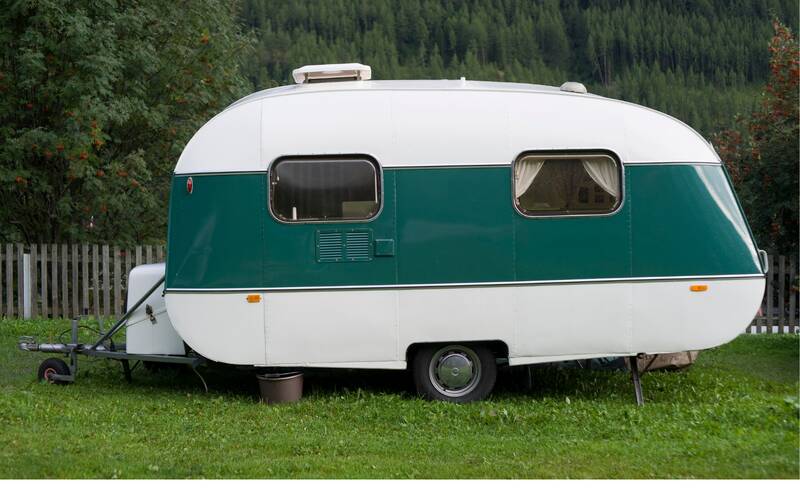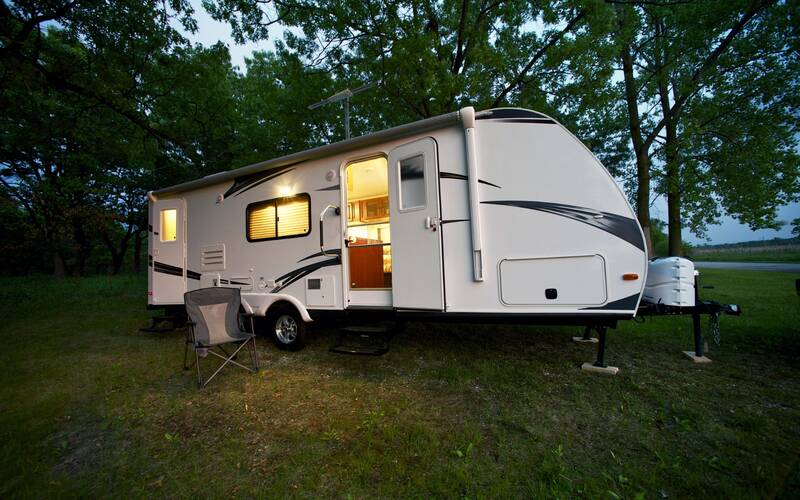Travel trailers don’t move on their own. They “trail” behind a truck. So they don’t need a battery right? Wrong. They have essential electrical components that keep you and other motorists safe. Namely, electric wheel brakes. These must function if you want to stay on the right side of the law. That’s why you need a travel trailer battery to power them.
But don’t forget about other essentials – like lights, appliances, and your water pump. Camping isn’t as comfortable without the basics. So you’ll want a travel trailer battery along for the ride! But maybe you’re wondering, “What kind of travel trailer batteries do I need? How many, and what voltage?” We’ll answer those questions and more in this quick guide to choosing a travel trailer battery.
What Kind of Travel Trailer Battery Do I Need?
To power electrical components in your travel trailer, you need a deep cycle battery – the same type of battery you’d use for a trolling motor. It’s also the same type of battery you would use as a house battery for an RV. Deep cycle batteries provide continuous power for a long time. This is different from a starting battery in a vehicle, which provides a powerful boost of energy for a brief amount of time.
Types of Travel Trailer Batteries/RV Batteries
So you just bought a shiny new travel trailer. Or, you’re ready to replace the battery in your trusty old trailer. You may have noticed that there are many different types of deep-cycle batteries you can use. Choosing a travel trailer battery should not be confusing, but it’s easy to get bogged down in the details. Here’s the basics.
These are the four main types of travel trailer batteries:
- Lead acid batteries (flooded lead acid battery and sealed)
- AGM battery
- Gel batteries
- Lithium batteries
Of these four, lead-acid batteries are the cheapest option (at least short term). But it’s also the one with the shortest lifespan. These batteries require maintenance to prevent damage from sulfation and leakage. They are also heavy as a pile of bricks, and you can’t drain them past 50% capacity.
AGM travel trailer batteries don’t need as much maintenance as lead acid batteries, and you can discharge them up to 80%. But they have a downside-they can overcharge easily.
Gel batteries are a step above lead acid batteries because they’re sealed to prevent leaks. They work well in extreme temperatures but charge very slowly.
Did you enjoy this post? You’ll probably like this one too: The Ultimate Guide to Full-Time Camper Living: Pros & Cons

Limited space in your travel trailer? Lead acid batteries can take up a lot of space. Lithium batteries are the smallest and lightest travel trailer battery option. But that doesn’t mean they’re less powerful. The lithium iron phosphate chemistry gives them superior stability, efficiency, and safety. This is the fastest-charging battery type and also the longest-lasting. So for many, this makes them the best battery for their travel trailer.
How Many Deep Cycle RV Batteries & What Voltage?
Limited space in your travel trailer? Lead acid batteries can take up a lot of space. Lithium batteries are the smallest, lightest travel trailer battery option. But that doesn’t mean they’re less powerful. The lithium iron phosphate chemistry gives them superior stability, efficiency, and safety. This is the fastest-charging battery type, and also the longest-lasting. So for many, this makes them the best battery for their travel trailer.
How Many Deep Cycle RV Batteries & What Voltage?
Once you’ve picked what type of travel trailer battery you’ll use, it’s time to figure out exactly what your battery bank will look like.
The voltage you’ll need is 12V, but the amp hours vary according to how many components you need to power, and for how long. For most travel trailers, you have two choices.
- Two to six 6-volt batteries
- One or two 12-volt batteries
The amp hours (Ah) of these batteries can vary from 50Ah to 400Ah. For pull-behind campers, you’ll most likely need 12V 100Ah or 12V 125Ah batteries.
If you choose to use 6-volt batteries, you can wire them in a series to obtain 12 volts. If you’re using 12-volt batteries, you can wire them in parallel to get more amperage.
See a graph here to discover which Ionic Lithium RV Battery is right for your travel trailer.
Travel Trailer Battery Accessories

A travel trailer battery bank is an investment. So let’s talk about protecting that investment! When you’re towing your pop-up or trailer, there’s bound to be some bumps along the way, jostling things around. So you want to make sure your deep cycle RV batteries are secured!
That’s where a travel trailer tray can come in handy. Travel trailer battery boxes or trays are built tough to withstand, well, travel! You can bolt them down to keep your batteries from sliding around and causing damage to themselves and other cargo in your trailer.
Another handy RV battery accessory is a charger. Using a charger specific to your RV battery type ensures your battery charges as fast as possible. It also protects it from damage and helps you get a full charge.
What’s better than a good, sturdy RV battery charger? A smart battery charger. If you choose lithium travel trailer batteries, using a smart lithium charger is the best way to harness their full potential. Smart chargers protect your RV batteries from undercharging and overcharging. They stop charging once the battery is charged, so you can set it and forget it.
Have more than one travel trailer battery? Find yourself in a hurry? A bank charger saves your time by charging up to four RV batteries at once.
Need More Help?
Finding the right travel trailer battery isn’t rocket science. But with so many options to choose from, it can be tricky! Contact us here and we’ll set you up with the right power bank for your RV, travel trailer, or pop-up.
Travel Trailer Battery Quick Answers
Do I need a deep cycle battery for my travel trailer?
Yep. You need a deep cycle battery for your travel trailer because they only run on deep cycle batteries.
How long does a battery last on a travel trailer?
Usually around two or three days for the normal battery bank with the typical amount of energy consumption. That said, if you have a larger battery bank or are very conservative in your energy usage, you can last around a week or even longer.
What size battery do I need for my travel trailer?
To choose the best battery for your travel trailer, it’s critical to consider how much power you need. Your best bet is to talk to one of our experts to determine exactly what you need to power and which batteries are best for your unique situation. But generally, 12V 100Ah and 12V 125Ah batteries are some of the most common batteries for travel trailers.
Will my truck charge my RV Battery?
Typically, trucks do charge the travel trailer battery while driving. But the charge they emit isn’t enough to power a depleted battery. (The truck provides a high charging rate at the starting point. But the charging rate reduces as the truck’s battery reaches its optimum charge.)
This means it’ll partially charge your travel trailer battery, but not to the optimum level. You can get a charger to solve that problem.
How many RV batteries do I need?
It depends on a bunch of things. Like what specifically you need to power, for example. How much energy you’ll consume, how long your trips will be, etc. You’ll probably need around multiple batteries, maybe 5-ish for your DC system. Maybe a little more or less, depending on your specific needs. Also, you’ll need a smaller system to start the engine/power your vehicle.
How long will my RV battery last running a furnace?
As long as you’re not expending energy on other things as well, you should be able to run it for well over 12 hours. However, it depends on several things, like the shape your batteries are in, whether they’re lithium or not, and their battery life (lithium RV batteries last much longer, and they’re maintenance-free too btw), etc.
So that covers RV batteries – but what about your van? How do you choose the best van batteries? Find out here!








